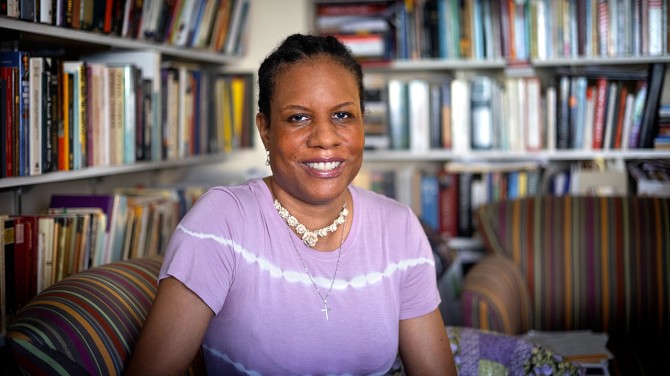‘Not her first rodeo’: Beyoncé scholar weighs in on ‘Cowboy Carter’
By Caitlin Hayes, Cornell Chronicle
Growing up as a Black girl in Alabama, Riché Richardson said country music and the predominantly white country aesthetic saturated popular culture. But even with few highly visible Black artists, Richardson – who loved Olivia Newton John and the 1980 film “Coal Miner’s Daughter” – felt the genre of country influenced her and belonged to her, too.
Richardson, professor of Africana studies in the College of Arts and Sciences, said reclaiming country music for the Black community and rebranding the genre as an inclusive space are among the triumphs of Beyoncé’s new album, “Cowboy Carter,” released on March 29 and widely considered the pop and R&B icon’s foray into – and challenge to – country as a genre.
“I totally identify with Beyoncé’s embrace of the genre and can understand how much it conceivably influenced her, because it influenced me,” said Richardson, who writes in and teaches Beyoncé studies. “In that way, she is living a lot of our dreams. She’s celebrating the diversity of country as a genre and showing that it belongs to everyone.”
Beyoncé, who grew up in Texas, achieves this not only through her own songs, Richardson said, but by including on the album Black country artists who haven’t been given their due, like Linda Martell, contemporary Black country artists like Tanner Adell and Brittney Spencer, as well as foundational white country artists such as Willie Nelson and Dolly Parton.
“She pays tribute to a really wonderful chorus of artists,” Richardson said. “But it’s important to recognize the foundational contributions of people of African descent to the development of country because you have these conceptions that they’re not part of it, they’re other to it, or they’re interlopers, and there’s a whole wealth of artists that belie those conclusions.”
Richardson said Beyoncé is challenging not only the country genre but broader conceptions of race, gender and of America as a nation. And while the full, album-length embrace of the genre is new in Beyoncé’s work – confronting these ideas is not.
For example, Richardson said, at her performance at the 2016 Super Bowl – at an event and game correlated with white culture – Beyoncé paid tribute to Malcom X and the 50th anniversary of the Black Panthers. In performances of her single “Formation” in predominantly white spaces, she has incorporated images of major social justice movements like Black Lives Matter, #SayHerName, Mothers of the Movement and #TakeAKnee. In her current promotion for “Cowboy Carter,” she projected images of the album, without prior consent, on the facades of major art institutions in New York City, including the Guggenheim Museum and the Whitney Museum of American Art.
“She’s putting pressure on these narrow notions of American identity that are correlated with whiteness,” Richardson said.
Richardson said the album iconography is a perfect illustration: on the album’s cover, Beyoncé sits astride a horse; she wears rodeo chaps and a cowboy hat, with the horse’s reins in one hand, and in the other, a large American flag.
“She’s using that national symbolism and announcing herself as a person of African descent in the genre of country, which is stereotypically associated with white identity,” Richardson said. “She’s challenging and deconstructing those perceptions and helping us to envision a more inclusive and expansive notion of American identity.”
Beyoncé is also challenging conceptions of Blackness as well, Richardson said. “For so long Black popular culture has been imagined as being quintessentially urban. How does she challenge our understandings of Black popular culture and what is admissible within its aesthetics?”
In her scholarship on Beyoncé, Richardson has long written of the importance of Beyoncé’s southern roots and how they have informed her identity throughout her career. She’s drawn parallels between Beyoncé’s rise and that of other Texas-born stars like Farrah Fawcett.
“This is not her first rodeo,” Richardson said. “She has been engaging in country discourses for a long time, and her national iconicity as a Black woman has been mediated through her background in Texas.”
For Richardson, the new album is a confirmation of this thesis and an opportunity for further study – she’s currently co-editing a book, with the working title “Beyoncé’s Souths,” about narratives of the South, including the Africana Southwest, in Beyoncé’s music, performance and promotion. Richardson is also looking forward to exploring these themes in the next iteration of her Cornell course on Beyoncé, Beyoncé Nation, which she taught in 2017 and in 2022, with frequent guest lectures from Beyoncé’s father, Mathew Knowles.
“The U.S. South can be figured in very stereotypical ways,” Richardson said. “So what does it mean to look at the region on its own terms, or look at the forms of cultural production and art that have been engendered there? Beyoncé gives us so many of these kinds of gifts, and that’s what makes her a vital cultural resource.”
Media Contact
Abby Kozlowski
Get Cornell news delivered right to your inbox.
Subscribe

